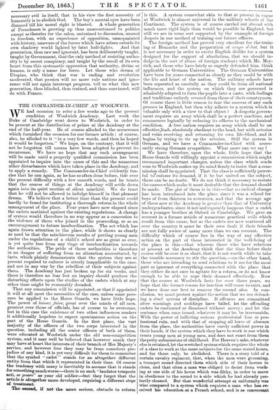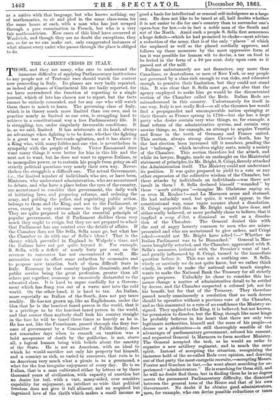TEE COXENIANDER-IN-CILLEF AT WOOLWICH.
WE had occasion to refer a few weeks ago to the present condition of Woolwich Academy. Last week the Duke of Cambridge went down to Woolwich, in order to be present at the distribution of prizes at the Academy at the end of the half-year. He of course alluded to the occurrence which furnished the occasion for our former article ; of course, also, he alluded to it " in a very few words, and then he hoped it would be forgotten." We hope, on the contrary, that it will not be forgotten till means have been adopted to prevent its recurrence. We have no hope that any such arrangement will be made until a properly qualified commission has been appointed to inquire into the cause of this and the numerous other disturbances which have taken place in the Academy, and to apply a remedy. The Commander-in-Chief evidently fan- cies that he can again, as he has so often done before, tide over the present difficulty with a few smooth words, and he trusts that the course of things at the Academy will settle down again into its quiet routine of silent mischief. We do trust that he will not be allowed to indulge himself in that pleasant dream. We believe that a better time than the present could hardly be found for instituting a thorough reform in the whole inanagement of the place. Four years have now elapsed since the cadets mutinied against the existing regulations. A change of system would therefore in no way appear as a concession to the violence of those who joined in the proceeding, or as an encouragement to future insubordination. The act which has again drawn attention to the plaPP, while it shows as clearly as need be that the mischievous results of putting young men under the regulations of a child's school are as great as ever, is yet quite free from any tinge of insubordination towards the authorities. The pride of those authorities is therefore in no danger of suffering from an alteration necessitated, by facts, which plainly demonstrate that the system they are at present required to enforce is utterly inapplicable to the case, and not in any way by the rebellion, of their subjects against
them. ,The Academy has just broken up for six weeks, and there is therefore no fear lest an inquiry should produce the disturbing effects upon the studies of the cadets which at any other time might be reasonably dreaded.
That any commission will be appointed, or that if appointed it will at all meet the necessities of the case, unless some pres- sure be applied to the Horse Guards, we have little hope.
The power of laissez faire, great over the minds of all men, greatest over those of officials, has of course to be overcome, but in this case the existence of two other influences renders
it additionally hopeless to expect spontaneous action on the
part of the Horse Guards. In. the first place, the vast majority of the officers of the two corps interested in the
question, including all the senior officers of both of them,
were educated at Woolwich under the old non-competition system, and it may well be believed that however much they may have at heart the interests of their branch of Her Majesty's
service, and however free they may be from conscious pre- judice of any hind, it is yet very difficult for them to.remember that the symbol " cadet ' stands for an altogether different entity from that which it represented in their time. Of course the tendency with many is inevitably to assume that it stands for something muchworse—there is no such "laudator temporis
aeti, se puero" as your old soldier—but they forget that the article is altogether more developed, requiring a. different stage of treatment.
The second, if not' the wore serious. obstacle to reform
is this. A system somewhat akin to that at present in vogue at Woolwich is almost universal in the military schools of the Continent. The system is of course carried out abroad with much more rigid logic than would be possible in England, but still we are in some sort supported by the example of foreign despots in our method of training our future officers.
The foreign method has proved very excellent for the train- ing of Bismarks and the preparation of coups d etat, but it is not necessary in order to excite English dislike for a system designed for the support of absolutism, that we should in- dulge in the sort of abuse of foreign students which Mr. Mey- rick, and those who have lately so eagerly defended him, think applicable to German Universities. The German Universities have been for years connected as closely as they could be with the life and heart of the nation. The military schools have been separated as carefully as they could be from all national influences, and the system on which they are governed is admirably adapted to form the pupils into a caste, with feelings and traditions entirely severed from those of their countrymen. Of course there is little reason to fear the success of any such process in England, but then why adhere to a system which is valuable only with a view to that object ? A despotic govern- ment requires an army which shall be a perfect machine, and commences logically by reducing its officers to the mechanical condition. A free nation requires an army which shall be an effective limb, absolutely obedient to the head, but with arteries and veins receiving and returning its own life-blood, and it begins by trying to tie up the arteries. Still the system is German, and we have a Commander-in-Chief with neces- sarily strong German sympathies. What more can we say ?
We have therefore, upon the whole, little hope that the Horse Guards will willingly appoint a commission which might recommend important changes, unless the class which sends sons to Woolwich makes up its mind firmly to insist that a com- mission shall be appointed. That the class is sufficiently power-
ful to its demand, if it be but united on the subject, there can be no doubt. We do not think it necessary to restate the causes which make it most desirable that the demand should be made. The gist of them is in this—that no radical change has been introduced into the place since it was a school for boys of from thirteen to seventeen, and that the average age of those now at the Academy is greater than that of University undergraduates, since it not unfrequently happens that a cadet has a younger brother at Oxford or Cambridge. We gave an account in a former article of numerous practical evils which result from this cause, but as the cadets are now scattered all over the country it must be their own fault if their friends are not fully aware of many more than we can recount. The difficulty which of course lies in the way of any effective action on the part of those interested in the well-being of the place is this—that whereas those who have relations at present at the Academy think that the time before their course will be over is so short, that it is not worth while to take the trouble necessary to stir the question,—on the other hand, those who are intending to send relations to it are for the most part so ignorant of everything connected with the place that they either do not care to agitate for a reform, or do not know enough to be able to urge their demand effectively. Now that the course at Woolwich lasts for over three years, we hope that the former reason for inaction will cease to exist, and
we have done our best to remove the second also. In con- clusion, we must protest against the notion that we are defend-
ing a slack system of discipline. If offences are committed after warnings and scoldings have failed, let the offending Cadets be rusticated or dismissed without mercy ; and let the
sentence when once issued, whatever it may be, be irrevocable.
With the power of inflicting serious professional loss or pro- fessional ruin, and with that of stopping all leave of absence from the place, the authorities have surely sufficient power in
their hands, if the system which they have to work is one which treats young men as young men, and does not exact from them
the petty submissions of childhood. For Heaven's sake, whatever else isretained, let the wretched system which requires the whole of a class to work at the same subjects for the same stated hours, and for those only, be abolished. There is a story told of a certain cavalry regiment, that, when the men were grooming, a trumpet sound directed them which side of their horses to
clean, and that often a man was obliged to desist from work ing at one side of his horse which was filthy, in order to move in obedience to the sound to a -side which he had already per- fectly cleaned. But that wonderful attempt at uniformity was wise compared to a system which requires a man who has re- ceived his education at a French school, and is as conversant































 Previous page
Previous page